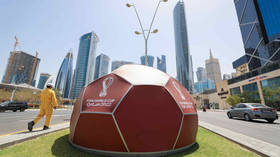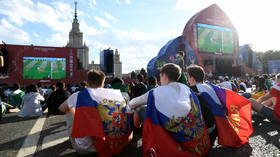Qatar set to soften rules for World Cup lawbreakers – Reuters

Football World Cup host Qatar is developing plans to reduce punishments for fans that commit minor offenses such as public drunkenness at the upcoming tournament, according to a report.
A diplomat and a person close to Qatari briefings have told Reuters that while the policing strategy for the event set to kick-off in November is still to be finalized, organizers have told diplomats and police from the countries taking part that they will show flexibility on minor infringements.
“Minor offenses won't result in a fine or arrest, but police will be instructed to go to a person and ask him or her to comply...Someone who removes a T-shirt in public will be asked to put his T-shirt back on. There is some sort of tolerance,” said the person familiar with the briefings sent to several European police forces.
The report will be seen as further evidence of Qatar attempting to strike a balance between local religious traditions and accommodating visiting football fans from different cultural climates.
A Western diplomat noted that “increased leniency pleases the international community, but comes with the risk that it might upset conservatives inside the country,” however, with many embassies instructing traveling supporters that they could face punishment for behavior tolerated elsewhere.
According to Qatari law, homosexuality is illegal, sex outside marriage is outlawed and public drunkenness can be met with a prison sentence of up to six months.
Public displays of affection or wearing revealing clothes can be considered grounds for arrest too, and US diplomat Morgan Cassell warned in a YouTube video: “Remember, while you're in Qatar, you are subject to local laws.”
“Arguing with or insulting others in public could lead to arrest. Activities like protests, religious proselytizing, advocacy of atheism and criticism of the government of Qatar or the religion of Islam may be criminally prosecuted here. That applies to your social media posts, too,” Cassell also said.
Organizers already intend to relax laws that limit the public sale of alcohol which could boost public drunkenness, with beer served close to stadiums a few hours ahead of kick-off.
And though Qatari authorities haven’t confirmed this approach, it is believed that special legislation during the tournament will give Qatar's World Cup security chief – known as the Gold Commander – leeway in tackling “acts in violation of the provisions of the laws in force in the country.”
Police are planning tougher action whenever the safety of people or property comes under threat, though, and World Cup organizers told diplomats this in a briefing a few months ago, according to several diplomats.
For fans who let off flares and fireworks which could cause damage, or are involved in fights, they can expect to be hit with fines and the cancelation of their ‘Haya card’ used to enter Qatar and gain access to stadiums, a Reuters source said.
To help with security, organizers have invited each qualified nation to send at least four police officers to patrol the ground in Qatar during the World Cup, according to the source familiar with policing plans.
“They will police it as they see fit...Our job is to say ‘This is how we think you should deal with our fans because that's what gets the best results’,” said Chief Constable of the Cheshire police and Britain’s leading police officer on football, Mark Roberts.
The police officers will be based around the capital Doha to help their Qatari counterparts during the tournament, which runs from November 20 to December 18, and also at a Ministry of Interior command center, Reuters claims.














